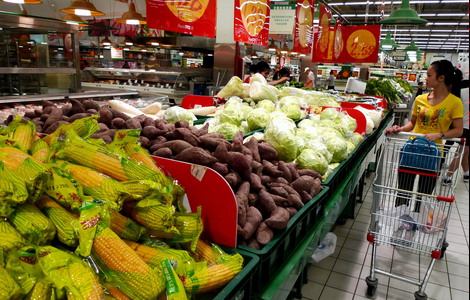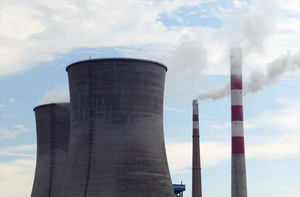Tough to meet CPI target, NDRC head says
Updated: 2011-08-26 09:23
By Li Xiang (China Daily)
|
|||||||||||
|
 |
|
Consumers examine vegetables at a supermarket in Taizhou, Zhejiang province. Potential weather-related food shortages and rising costs of domestic production are likely to increase inflationary expectations, according to Zhang Ping, chairman of the National Development and Reform Commission. [Photo / China Daily] |
"The fact that global liquidity remains excessive is unlikely to change in the short term, and global commodity prices remain at high levels, which means that China's imported inflationary pressure will not weaken," Zhang said at a conference of the National People's Congress, the country's top legislature.
Zhang noted that rising domestic production costs, combined with potential weather-related shortfalls of some agricultural products, are likely to heighten inflationary expectations.
"These factors will all make it difficult for the government to meet the full-year inflation target of 4 percent," he said.
Inflation hit a three-year high in July, with the consumer price index (CPI) rising 6.5 percent year-on-year, driven by soaring food prices, according to the National Bureau of Statistics.
Analysts said that China's higher-than-expected inflation level posed a serious challenge to policy makers, as the People's Bank of China might delay further interest rate hikes until world financial markets and economic conditions stabilize.
Uncertainty, instability
Zhang said that the weak global recovery and sovereign debt crises in Europe, the US will have a negative effect on China's economy.
"The negative effect of the stimulus policies adopted by developed countries has begun to emerge, as global inflationary pressure has started rising and sovereign debt crises in Europe and the US remain serious," he said.
Further, he said, political turmoil in Western Asia and North Africa and volatile world commodity prices will exacerbate the uncertainty and instability surrounding the global economic recovery.
Zhang noted that the central government will continue to boost the development of affordable housing to achieve its goal of building 10 million units of low-income housing this year.
The government has so far provided 773 million square meters of land and 170.5 billion yuan ($26.6 billion) in subsidies for the construction of affordable housing, according to Zhang.
Finance Minister Xie Xuren said on Thursday that the central government had spent 1.15 trillion yuan, or two-thirds of the central budget in the first half of the year, to raise living standards.
The funds were mainly used to support education, social security, job creation, healthcare and affordable housing, with 576 billion yuan going into the social security and job creation sectors, according to Xie.
Related Stories
Rising prices eat into food companies' income 2011-08-24 11:29
Taxing times despite new rate 2011-08-23 09:23
China needs to do more to fight inflation 2011-08-22 09:41
China inflation may hit 6.2% in Q3 2011-08-16 09:34
- China Unicom Q2 profit outstrips analyst estimates
- Jobs' quit will provide more opportunities for ZTE
- CNR Corp posts 145% jump in H1 net profit
- China raises funding to boost grain security
- China's rail firms post shrinking profits
- ICBC stays on overseas expansion track
- Tough to meet CPI target, NDRC head says
- Control property policies to continue













